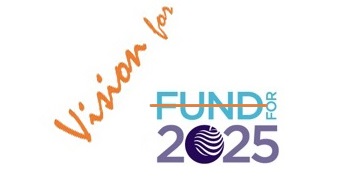
Your VISION for 2025 – A Report on Year Two
(November 2015-October 2016)
Background: At the start of 2014, Philanthropy New York faced two separate challenges. The first was the recognition that its strategic plan set forth ambitious goals in the areas of programming, public policy and institutional sustainability that would be difficult to reach with the existing budget. The second was a reckoning with NYC real estate. Our office lease ended in June 2015 and renewing it wasn’t possible. Our Board and staff saw the situation as an opportunity to communicate with our members about the long-term possibilities for both PNY and the capacity of the philanthropic sector of the region. These challenges turned into the opportunity we called The Fund for 2025 – A Vision for the Next Decade.
Because we officially launched the Fund for 2025 campaign in October 2014, we have committed to reporting on the progress of our long-term plan supported by the Fund every Fall over the next decade.
Philanthropy New York successfully raised over $3.7 million for the Vision for 2025 dedicated to the following areas:
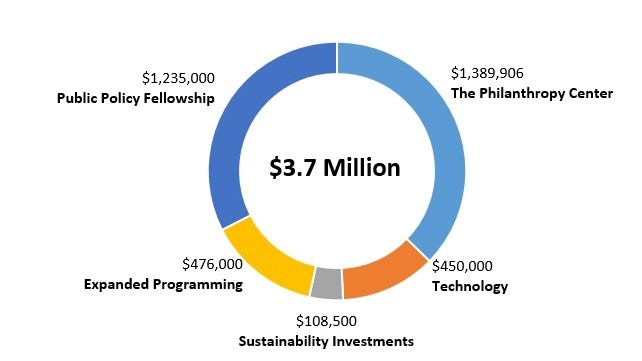
We have made remarkable progress in all five areas of the Vision for 2025 in the period November 2015-October 2016:
The New Philanthropy Center at 1500 Broadway
|
The Central Park Conference Room, set up to seat large gatherings up to 75 people. |
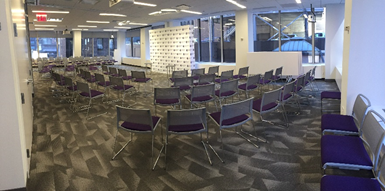 The bulk of Philanthropy New York’s work and expenses related to the establishment of our new Philanthropy Center at 1500 Broadway occurred in the previous year was the subject of our Year 1 Report on the Fund for 2025. In the 2015-2016 period, PNY continued to host an elevated number of programs and events in the new space, which we expect to continue over the coming years.
The bulk of Philanthropy New York’s work and expenses related to the establishment of our new Philanthropy Center at 1500 Broadway occurred in the previous year was the subject of our Year 1 Report on the Fund for 2025. In the 2015-2016 period, PNY continued to host an elevated number of programs and events in the new space, which we expect to continue over the coming years.
Major Technological Improvements to Support Member Communications
The move also presented an opportunity to upgrade our technology to better serve our members across the entire region with better sound and audio recording systems, video equipment, and control room technology, as well as upgrade our website and other online infrastructure. We designed technology systems that allowed for greater connectivity and ease of use for both staff and members. We built livestreaming capacity into both the larger and medium conference rooms and video teleconferencing in the smaller huddle rooms. Most of the IT expenses in this reporting period related to refining our audio and video delivery, new microphones and other related equipment.
As a result, we continue to increase the number of programs that we live-stream. This year we produced 29 of live-streamed programs and an additional 11program clips and audience reaction interviews that highlighted pieces of key program moments.
The Fund for 2025’s support for IT was also to be allotted to continuous website improvements and other multimedia platforms. Over the 2015-2016 period, we began to use some of these funds to develop a new online resource called PhilTV, which we will launch in early 2017. That portion of our site will also have curated video content from our members and their grantees, PHIL Talks from our annual meetings, and socially-relevant viral videos.
Public Policy Fellowship
The purpose of the Philanthropy New York Public Policy Fellowship is two-fold: 1) to support our commitment to growing diversity in the philanthropic community by identifying early-career professionals who will benefit from learning about and networking within the philanthropic sector; and 2) to increase our organizational capacity in government relations and issue-based organizing.
Due to our early success in fundraising, and the encouragement of our membership, Philanthropy New York’s board has approved a full 10 year public policy fellowship. This meant that, over the course of the next decade, we would be able to hire five post-graduate professionals for a two-year commitment each. In addition, the Atlantic Philanthropies provided a generous gift of $800,000 that will allow us to hire a second fellow and run a consecutive program. This gift required matching funds of $250,000 over the 10-year life of the grant. Those funds will come from the Fund for 2025.
Public Policy Fellow Stephanie Chrispin
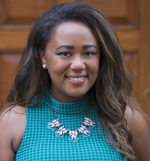 Stephanie Chrispin, our first fellow, joined our team in late July 2015. Deeply involved in the Filipino-American community, Stephanie is President of the board of Pilipino American Unity for Progress, Inc (UniPro). Stephanie previously served as Vice President and Fundraising Director for UniPro, where she established the organization's fundraising and grants management programs. In addition, she currently sits on the board of the Filipino American National Historical Society (FANHS) Metro New York Chapter. She holds an M.P.A. in Health Policy and Finance from New York University's Robert F. Wagner School of Public Service and a B.S. in General Science and History from Fordham University.
Stephanie Chrispin, our first fellow, joined our team in late July 2015. Deeply involved in the Filipino-American community, Stephanie is President of the board of Pilipino American Unity for Progress, Inc (UniPro). Stephanie previously served as Vice President and Fundraising Director for UniPro, where she established the organization's fundraising and grants management programs. In addition, she currently sits on the board of the Filipino American National Historical Society (FANHS) Metro New York Chapter. She holds an M.P.A. in Health Policy and Finance from New York University's Robert F. Wagner School of Public Service and a B.S. in General Science and History from Fordham University.
During the past year, Stephanie has served as the staff liaison for two of Philanthropy New York’s issue-based working groups, Funders of Women and Girls and the Health Working Group. She spearheaded the development and execution of several programs including “Local to Global: Efforts to Address the Increasing Prevalence of Teen Girl Suicide,” “School Discipline, Pushout and Gender Norms,” “End the Sexual-Abuse-to-Prison Pipeline,” “Intersections of Health and Justice: A Conversation on LEAD and New York’s Opioid Epidemic,” and “Brownsville as Case Study: Can Community Investments Improve Health?”
Stephanie was also instrumental in the development of a new tool from the Funders of Women and Girls, “Starting the Conversation: Using a Gender Lens in Your Grantmaking.”
She wrote several feature pieces for PNY’s multimedia platform, The New York PhilPost.
Stephanie has curated news items and solicited pieces for the New York PhilPost’s Insights column, e.g. Some Winning Ingredients in Movement Building Are the Spiciest of All, and wrote her own original content for the website (“For CEIP, Don’t Call It a Comeback”). On the policy front, Stephanie researched and drafted issue guides on donor advised funds and the Philanthropic Enterprise Act, the former of which positioned Philanthropy New York as a thought leader on the issue and resulted in an invitation to participate in a conference on donor advised funds in late 2015.
In keeping with Stephanie’s interests, she has also begun to serve as staff liaison for the Committee for Equitable and Inclusive Philanthropy. In this role, she continues PNY’s long history of supporting programs that seek to increase diversity in the philanthropic sector and beyond.
Stephanie is paired with two philanthropic leaders who serve as her official mentors: Patricia Eng, Vice President of Programs for New York Women’s Foundation, and Cynthia Rivera-Weissblum, President and CEO of Edwin Gould Foundation. She has had quarterly meetings with her mentors. This summer, she was matched with a high school student through the program Futures and Options, and she developed a six-week internship project for the student.
In 2016, we doubled the number of academic institutions where we disseminated the fellowship application. This resulted in an even stronger set of candidates in the second year.
Public Policy Fellow Shiza Pasha
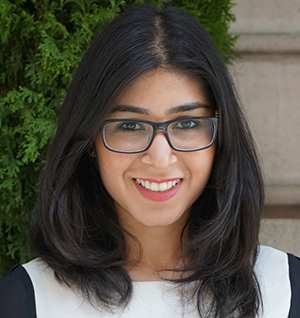 In August, Shiza Pasha began her two year fellowship. In her role, Shiza supports the work of PNY’s International Grantmakers Network (IGN), our Education Working Group, and our growing work on justice reform. Prior to joining PNY, Shiza taught high school math for two years in Charleston, SC as a Teach For America corps member. She has also previously worked at the United Nations World Food Programme (WFP), where she helped secure and manage private sector partnerships and funding for international development projects around food security, sustainable agriculture, and disaster relief. While an intern at Edelman, Shiza built a tool to measure the Corporate Social Responsibility (CSR) efforts of major global companies and helped build out their CSR campaigns. In line with her passion to help students of all backgrounds access education and opportunities, she serves as a mentor for the New Jersey chapter of America Needs You (ANY), where she works with first generation college sophomores and juniors. She has a B.A. in International Affairs from the Georgia Institute of Technology, and she recently completed a Master’s degree in International Affairs from the School of International and Public Affairs (SIPA) at Columbia University.
In August, Shiza Pasha began her two year fellowship. In her role, Shiza supports the work of PNY’s International Grantmakers Network (IGN), our Education Working Group, and our growing work on justice reform. Prior to joining PNY, Shiza taught high school math for two years in Charleston, SC as a Teach For America corps member. She has also previously worked at the United Nations World Food Programme (WFP), where she helped secure and manage private sector partnerships and funding for international development projects around food security, sustainable agriculture, and disaster relief. While an intern at Edelman, Shiza built a tool to measure the Corporate Social Responsibility (CSR) efforts of major global companies and helped build out their CSR campaigns. In line with her passion to help students of all backgrounds access education and opportunities, she serves as a mentor for the New Jersey chapter of America Needs You (ANY), where she works with first generation college sophomores and juniors. She has a B.A. in International Affairs from the Georgia Institute of Technology, and she recently completed a Master’s degree in International Affairs from the School of International and Public Affairs (SIPA) at Columbia University.
In her role as staff liaison for IGN, Shiza supports the steering committee in sourcing and executing program ideas, as well as managing member engagement. As the liaison to the Education Working Group, she analyzed and shared the findings of a survey administered by PNY in Spring 2016 to better understand its members’ funding priorities in the K-12 Public Education space. The Connecting the Education Funding Dots report also aims to foster member collaboration and inform future programming and direction for the group. In addition, Shiza helps manage an ad-hoc working group of members interested in justice reform, born out of the success of PNY’s 2016 Annual Meeting. She is spearheading program development and execution of a four-part programmatic Criminalization of Poverty series, slated to launch in early 2017. The series will explore the intersection of justice reform and other issues such as homelessness, immigration detention, and an unfair bail and fee system. Shiza is conducting the primary outreach and coordination of the series, allowing her to participate in direct conversations with academic, government, philanthropic, and non-profit leaders.
Shiza has curated news items and solicited pieces for the New York PhilPost’s Insights column and has conducted interviews with program attendees, as part of PNY’s multimedia content.
Programming
Our Vision for 2025 included enhancements to our existing programming outlined in our current strategic plan, as well as the development of new programs. To best determine how to focus our efforts on programming, we partnered with the Center for Effective Philanthropy in 2016 to develop and implement a survey to members which launched in early March. The results of the survey were shared with our board during a day long off-site retreat and were used as a guide for our new strategic plan which was approved, after a member comment period, by our Board of Directors.
In 2016, we continued to develop deeper dive series, a goal outlined in our current strategic plan. Many of those series are newly framed “PNY CORE: Fundamentals of Philanthropy.”
The Philanthropy New York Core (PNY Core) features multi-part learning series that explore areas  where members have requested a perennial refresher. These professional development and skills-based programming center on specific lines of inquiry and are designed to meet the needs of philanthropic professionals at every stage of their career arc.
where members have requested a perennial refresher. These professional development and skills-based programming center on specific lines of inquiry and are designed to meet the needs of philanthropic professionals at every stage of their career arc.
Separately from the PNY Core, our Impact Investing Series explored the many new ways funders can have a social impact using all of their financial resources. Participants have benefited from insights of philanthropic leaders in the world of impact investing. We covered 1) the impact investing continuum; 2) active ownership and divestment; 3) the Rikers social impact bond experiment; and getting your board on board. Our Legal Series was developed in response to member feedback after we hosted a program which provided an overview of legal and regulatory boundaries, focusing especially on questions that often arise with family foundations. Program participants identified a need for more learning about legal and regulatory boundaries on several key topics, not just for family foundations, but for a wide range of philanthropic organizations that do not have their own in-house counsel. Aimed at program officers, executive directors of small foundations, grants managers, as well as legal and/or general counsels looking for a refresh, the four-part Legal Series program provided an overview of the legal and regulatory boundaries in Individual Grantmaking, International Grantmaking, Self-Dealing (Family Foundations and Family Offices), and Fiscal Sponsorships.
Our first two investments in new and refined programming as a result of Fund for 2025 support are a deep-dive revision of our popular Essential Skills and Strategies curriculum, which has been re-vamped and will be re-launched in January 2017. Essential Skills and Strategies orients new program officers and directors to their role as funders and helps them build a framework for understanding and implementing ethical and effective grantmaking. The program prepares program officers and directors for the “science” of philanthropy – offering training on the tools and skills to be effective grantmakers and philanthropy professionals overall. Through highly interactive sessions with peers, it also offers strategies for managing the “art” of philanthropy – building participant intuitive skills that bring greater clarity regarding their role and help build self-awareness of their unique contributions within the larger sphere of social change. This three-day intensive for new program officers and program staff has been updated with new resources, more interactive opportunities for peer reflection and the most timely thinking around issues that grantmakers grapple with most.
We also developed and implemented an entirely new series, Philanthropy 101, launched in September of 2016. Philanthropy 101 is designed to help any new staff person with professional experience outside of philanthropy better understand the philanthropic sector and roles. The offering is a pilot, and the curriculum was developed in partnership with the Johnson Center for Philanthropy's LearnPhilanthropy team. This interactive course will provide a historical overview of philanthropy, review a foundation's leadership and governance, debate the current big issues in philanthropy, provide an overview of grantmaking, and explore the various roles within philanthropy. Philanthropy 101 takes place over five Friday morning sessions on a monthly basis and is relevant to staff in any position at a grantmaking organization.
In addition to the above, 2015/2016 saw PNY expand our Young Leader’s Breakfast Club program, engaging 60 young professionals and 20 seasoned mentors from among our leadership in a 9 month mentorship program.
We continue to explore ways to share our programming and policy work with new audiences. In 2015, we held a total of 224 events, 29 livestreamed programs, and 23 webinars, with 125 programs held at Philanthropy New York. We have posted 26 program resources on our YouTube channel and website.
We had a total of 4,958 attendees at programs. Of this number, 3522 attendees were members and 1,184 were non-members. We had 1,326 individual members attend at least one program in 2016. We had 250 member organizations attend at least one program in 2016.
Sustainability
In the previous year, Philanthropy New York created a Sustainability Committee, composed of a cross-section of our membership, including very large foundations, corporate foundations, and very small private family foundations, as well as one non-member expert. The committee continued to meet over the course of the 2015-2016 period and began to investigate a few potential fee-based business lines.
We benchmarked similar nonprofit conference facilities and determined that, while there is a market and we are currently charging market rates for after hours use, we do not have additional capacity to promote this service beyond our members and member grantees.
We also explored the possibility of selling sponsorship to our Annual Meeting and will be piloting this revenue-generating opportunity in 2017.
We analyzed PNY’s consulting services and a Captive Insurance plan for members and determined that neither would be workable in the current NYC market. More specifically, this year we engaged in a lengthy and thorough examination of an opportunity, a captive insurance group, that we hoped would provide members with excellent health insurance benefits and a way to control the escalating costs of health insurance. The core idea behind the captive insurance concept is that Philanthropy New York members could band together to get access to better plans while reducing the costs over the years to come. We had nearly 40 members participate in the feasibility study. CBIZ ran an exhaustive RFP process on our behalf using the information provided. Upon discussing the fiscal models, timeline, changes in legislation, and larger market shifts currently in play, we have decided to pause this process. Given the timing and resources needed to accomplish the captive, and the decisions that many of our members faced in renewing plans, we did not want to ask our membership to delay other plans to ensure good coverage for 2017. We will remain attuned to the changes in the marketplace and federal/state law in the approaching year.
THANK YOU!
Major initiatives at Philanthropy New York do not happen unless they are member driven, and the idea of a fundraising campaign to capitalize the “Vision for 2015” is no exception. Led by Altman Foundation President Jane O’Connell and Surdna Foundation President Phil Henderson as Co-Chairs of the Fund for 2025 campaign, an influential set of leaders joined in to be committee members. They were:
|
Doug Bauer, Clark Foundation |
Melanie Mortimer, SIFMA Foundation |
|
Mark Bodden, Rudin Family Foundation |
Maria Mottola, New York Foundation |
|
Eric Eckholdt, Credit Suisse Foundation |
Mike Pratt, The Scherman Foundation |
|
Stephen Heintz, Rockefeller Brothers Fund |
Hildy Simmons, Brooklyn Community Foundation |
|
Kevin Jennings, Arcus Foundation |
Darren Walker, Ford Foundation |
|
Leisle Lin, Alfred P. Sloan Foundation |
And a HUGE THANK YOU to all the donors to the Fund for 2025.
To contribute or learn more about the Vision for 2025, please contact:
Ronna Brown, President, Philanthropy New York, rbrown@philanthropynewyork.org or 212.714.0699
